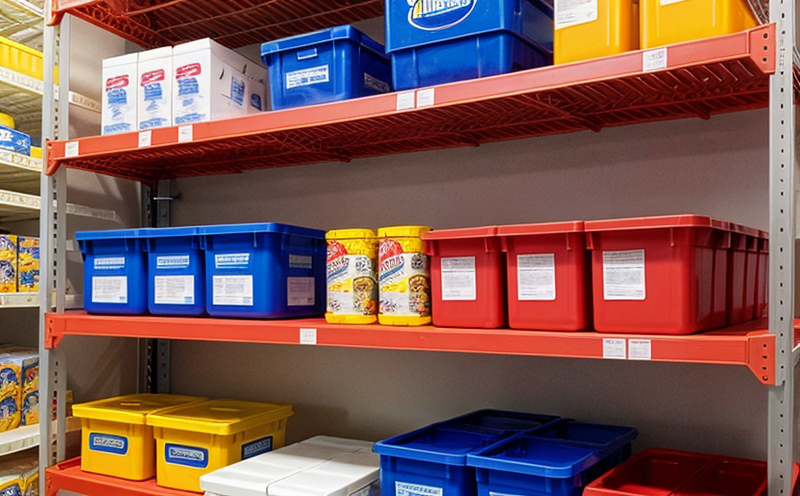ISO 17356 Real-Time Stability Analysis in Dairy Products
The ISO 17356 standard provides a robust framework for conducting real-time stability analysis in dairy products, which is essential for ensuring the quality and safety of these products throughout their shelf life. This service offers comprehensive testing to evaluate the chemical, physical, and microbiological stability of dairy items under various storage conditions. By employing this method, we can help our clients meet regulatory requirements while enhancing product performance and extending shelf life.
The real-time stability analysis involves monitoring changes in key parameters over time without artificial acceleration or destruction of the sample's integrity. This approach is particularly beneficial for dairy products due to their complex composition and sensitivity to temperature fluctuations. The standard outlines specific procedures for sample preparation, storage conditions, and data collection that are tailored to accurately reflect the real-world scenarios faced by these products.
Our laboratory specializes in providing this service using state-of-the-art equipment and methodologies compliant with ISO 17356. We utilize advanced sensors and monitoring systems capable of detecting minute changes in product composition over extended periods, ensuring precise and reliable results. This capability allows us to provide valuable insights into the stability characteristics of dairy products under different storage conditions, helping our clients make informed decisions about packaging, distribution, and marketing strategies.
One of the key advantages of real-time stability analysis is its ability to predict shelf life without requiring accelerated testing methods that could potentially alter the natural aging process. This ensures more accurate predictions of product longevity, which is crucial for maintaining quality and customer satisfaction. Additionally, by understanding how specific storage conditions affect dairy products, manufacturers can optimize their supply chain processes to minimize waste and maximize profitability.
The ISO 17356 standard emphasizes the importance of selecting appropriate test samples that represent typical commercial products. This ensures that the results obtained are relevant to real-world applications, enhancing the relevance and applicability of the findings for decision-makers in various sectors.
| Key Parameters Measured | Description |
|---|---|
| Fat content | The amount of fat present in the sample, which can change due to oxidation or other reactions over time. |
| Lactose concentration | The sugar content in milk products, which may vary depending on storage conditions and microbial activity. |
| Acidity level | Indicative of the degree of acidity present, reflecting potential spoilage or quality degradation over time. |
| Bacterial count | An indicator of hygiene and safety, ensuring compliance with regulatory standards and maintaining consumer trust. |
By leveraging real-time stability analysis, our clients gain a deeper understanding of the factors influencing dairy product quality. This knowledge enables them to implement proactive measures aimed at preserving freshness and extending shelf life effectively. Furthermore, adherence to internationally recognized standards like ISO 17356 instills confidence in both internal teams and external stakeholders regarding the reliability and consistency of test results.
Why It Matters
The importance of real-time stability analysis in dairy products cannot be overstated, especially given the increasing demand for safe, high-quality food products. Shelf life is a critical factor that affects both consumer satisfaction and business profitability. Ensuring that dairy products remain stable during storage not only enhances their marketability but also contributes to reducing waste and promoting sustainability.
For quality managers and compliance officers, real-time stability analysis provides valuable data for making strategic decisions regarding product development, packaging choices, and distribution networks. By understanding the exact conditions under which dairy products deteriorate, these professionals can design more effective strategies aimed at maintaining product integrity throughout its lifecycle.
R&D engineers benefit greatly from this service by gaining insights into how different variables influence dairy product stability. This information is invaluable for innovating new formulations or improving existing ones to meet changing market demands and regulatory requirements. Similarly, procurement teams can use the results of real-time stability analysis to negotiate better terms with suppliers who adhere strictly to quality standards.
In summary, real-time stability analysis serves as a cornerstone in ensuring that dairy products remain safe, nutritious, and appealing to consumers. It plays an integral role in maintaining brand reputation and fostering long-term relationships between manufacturers and their customers.
Applied Standards
The ISO 17356 standard provides a comprehensive framework for conducting real-time stability analysis in dairy products, ensuring accurate and reliable results. This section summarizes the key aspects of this international standard:
- Scope: The standard applies to all types of dairy products, including but not limited to milk, cream, butter, cheese, yogurt, and ice cream.
- Methodology: It specifies detailed procedures for sample preparation, storage conditions, and data collection methods that ensure the integrity of the samples throughout the testing process.
- Data Interpretation: Guidelines are provided on how to interpret the collected data to assess changes in key parameters over time accurately.
The application of ISO 17356 ensures consistency and repeatability across different laboratories, enhancing the credibility and acceptance of test results within the industry. By adhering to these standards, our laboratory guarantees clients that they receive unbiased, high-quality assessments of their dairy products' stability characteristics.
Competitive Advantage and Market Impact
- Predictive Shelf Life: Real-time stability analysis allows for more accurate predictions of shelf life, giving our clients a competitive edge in the market. This enables them to optimize production schedules and inventory management strategies.
- Informed Decision-Making: By understanding the factors that affect dairy product stability, our clients can make informed decisions about packaging materials and storage conditions, leading to improved product performance.
- Enhanced Consumer Trust: Ensuring consistent quality in dairy products builds trust among consumers, which is crucial for maintaining brand loyalty and attracting new customers.
- Sustainability Focus: The ability to extend shelf life through optimized storage conditions reduces waste, contributing positively to environmental sustainability efforts.
These competitive advantages translate into significant benefits for our clients, including increased market share, enhanced profitability, and greater customer satisfaction. Our laboratory's expertise in real-time stability analysis positions us as a leader in the field, offering unparalleled services that drive success in the dairy industry.





